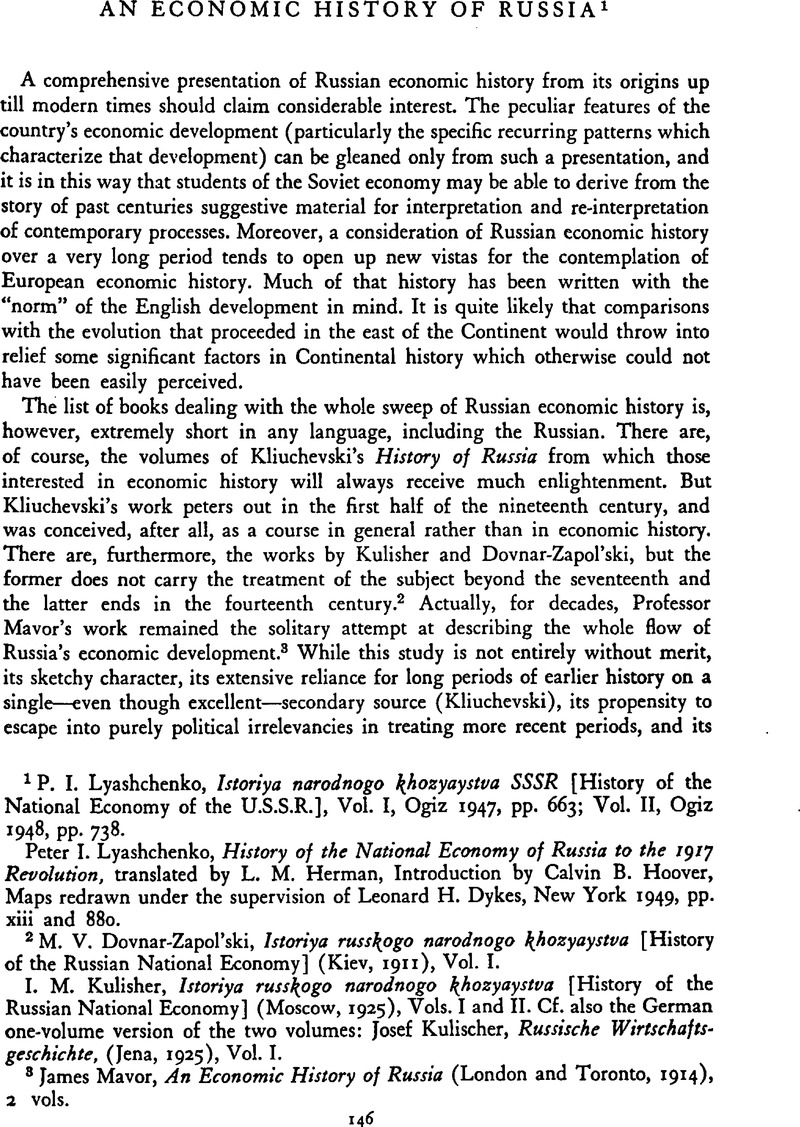Article contents
An Economic History of Russia1
Published online by Cambridge University Press: 03 February 2011
Abstract

- Type
- Notes and Review Articles
- Information
- Copyright
- Copyright © The Economic History Association 1952
References
2 Dovnar-Zapol'ski, M. V., Istoriya russkogo narodnogo khozyaystva [History of the Russian National Economy] (Kiev, 1911), Vol. IGoogle Scholar.
Kulisher, I. M., Istoriya russkogo narodnogo khozyaystva [History of the Russian National Economy] (Moscow, 1925), Vols. I and IIGoogle Scholar. Cf. also the German one-volume version of the two volumes: Kulischer, Josef, Russische Wirtschaftsgeschichte, (Jena, 1925), Vol. IGoogle Scholar.
3 Mavor, James, An Economic History of Russia (London and Toronto, 1914), 2 volsGoogle Scholar.
4 Gille, Betrand, Histoire économique et sociale de la Russia du moyen-âge au vingtième siècle (Paris, 1949), p. 236Google Scholar.
5 Picheta, V. I., Istoriya narodnogo khozyaystva v Rossii XIX–XX vekov [History of the National Economy in Russia of the Nineteenth and Twentieth Centuries] (Moscow, 1923)Google Scholar; Khromov, P. A., Ekonomicheskoye razvitiye Rossii v XXIX–XX vekakh [Economic Development of Russia in the Nineteenth and Twentieth Centuries] (Gospolitizdat, 1950)Google Scholar.
6 Those who find such a development surprising may do well to refer to the brilliant essay by Rosa Mayreder, Der typische Verlauf sozialer Bewegungen (Anzengruber Verlag, Vienna-Leipzig), and particularly to her fine discussion of the heterogeneous nature of ideologies in what she calls the “power-phase” of social movements (p. 28). This most illuminating essay (written in the spring of 1917) reads now, after more than four decades, like a historical sketch of ideological developments in Soviet Russia in the intervening period.
7 Cf. Lyashchenko, P. I., Istoriya russkogo narodnogo khozyaystva [History of the Russian National Economy] (Moscow-Leningrad, 1927), p. 13Google Scholar.
8 This moderation is to Lyashchenko's credit. At the time when he was preparing the present edition, altogether fantastic interpretations of the term “Rus” were given currency in Soviet Russia in connection with N. Marr's theories. Cf. e.g., N. S. Derzhavin, Proiskhozhdeniye russkogo naroda [The Origins of the Russian People], Moscow, 1944, where the word is derived from “Etruscan” (p. 52 ff.). At that time to show restraint in following Marr (as Lyashchenko does expressly, I, 22) required in Russia as much civil courage as it does there now, after Stalin's rejection of his theories, to refrain from a wholesale condemnation of that curious figure.
9 Mannheim, Karl, Ideology and Utopia (New York and London, 1949), p. 118Google Scholar.
10 It is indeed not easy to form a clear idea of Lyashchenko's real views on the matter. He dismisses as unfounded the views of M. N. Pokrovski, the Soviet historian who was posthumously purged in the second half of the thirties and who regarded the absolute monarchy between the sixteenth and the nineteenth centuries as an instrument of “commercial capitalism.” Lyashchenko's position makes very good sense, but the first (1927) edition of his present work contained a rather elaborate presentation of the same conception of the period as one characterized by “commercial capitalism.” Cf. Lyashchenko, pp. 123–273.
11 Cf. Smirnov, P. P., Posadskiye lyudi i ikh klassovaya borʼba do srediny XVII veka [Burgesses and Their Class Struggle before the Middle of the Seventeenth Century] (Moscow and Leningrad, 1947), I, 61, 134, 172, 177Google Scholar; and Rybakov, B. A., Remeslo drevney Rust [Handicraft in Ancient Russia] (Moscow, 1948), pp. 729 ff. and p. 781Google Scholar.
12 Tarle, E., “Byla li Yekaterininskaya Rossiya ekonomicheski-otstaloy stranoy?” [Was Russia of Catherine the Great Economically Backward?] (Sovremenny Mir [The Contemporary World], 1910, No. 5), pp. 3–29Google Scholar. Reprinted in Tarle, E. V., Zapad i Rossiya [The West and Russia], (Petrograd, 1918), pp. 122–49Google Scholar.
13 Cf. Struve, Peter, Krepostnoye khozyaystvo, Izsledovaniye po ekonomicheskoy istorii Rossii v XVIII i XIX vekakh [Serfdom Economy, Inquiry into the Economic History of Russia in the 18th and 19th Centuries] (Moscow, 1913), p. 159Google Scholar.
14 Cf. Struve, pp. 103–12.
15 To give a few examples: It would have been better to avoid the inconsistency of translating “vykupnyye platezhi” as “ransom payments” in some passages, and as “manumission payments” or as “redemption payments” in others. The last rendition is probably much more acceptable than the others and ought to have been used throughout. As it is, the reader has no way of knowing that all these terms mean one and the same thing. It is unidiomatic to use “correlation” instead of “rate of exchange” (II, 562) or “trade turnover” instead of “trade” or “volume of trade” (I, 264). Some historical terms have been misunderstood. “Khamovny” does not mean “common” (I, 290); it is the archaic adjective for “pertaining to weaving.” The important term “tyaglo,” the translation of which is admittedly difficult and must vary with the context, has been incorrectly rendered in spots. Thus the phrase “vozvratitʼ v tyaglo” (p. 208) should not have been translated by “to return to the household”; the phrase there means “to return [a person] to tax paying status.” The terms “zakladchiki,” “dvorniki,” and “zakhrebetniki” have been translated respectively as “pawnshop keepers,” “janitors,” and “porters” (I, 207). This is wrong. These terms were essentially not occupational, but referred to personal relationships to third persons which tended to make the subjects exempt from “tax paying status.” Curiously enough, the cognate term “zakladnichestvo” appears awkwardly, but meaningfully translated as “personal mortgaging” on the very next page.
- 7
- Cited by




